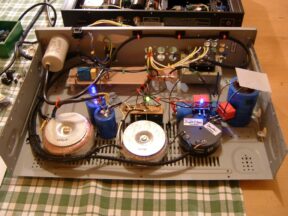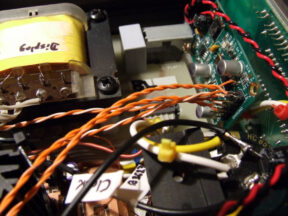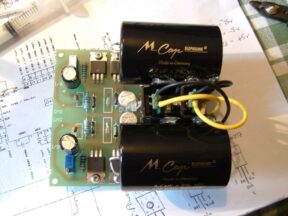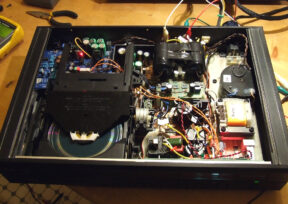Background
This old stalwart dates back in design to about 1989 and I believe mine was made in 1991. The Arcam Alpha uses one of the first DAC chips around, the famous TDA1541(A). Here’s a good page dedicated to players featuring this chip: Lampizator guy. The author of that site is famous in DIY circles but misses a few important tricks when modifying CD players.
I tend to think of CD players as offering three main areas for making substantial sound quality improvements: power supplies, clocking, output stage. Many novice upgraders never progress beyond fettling the analogue output section of a CD player. This is a shame because the really big gains typically come from improving power supplies and clock arrangements.
Power supplies
The Alpha is better than some as standard, featuring two power transformers and a 6 x 1000uF bank of smoothing caps for the DAC & op-amps. It seems clear upon internal inspection that Arcam have taken a generic Philips PCB and power transformer etc, then added their own DAC / output stage board which is powered by a second transformer. Sadly this transformer is prone to mechanical buzzing (a side effect of poorly constructed frame transformers). One of my earlier modifications was to replace this with a toroidal transformer of the same secondary voltages (17.5V — 0V — 17.5V). The main PCB’s PSU caps power everything other than the DAC chip and output op-amps. Most, if not all, of these should be replaced, not only to improve sound quality but also because the electrolyte in the caps could be drying up after 20+ years! It is fashionable and indeed seems beneficial to change rectifier diodes with soft-recovery types, usually “schottky”. In my opinion this is a safe modification on digital supplies but may worsen the sound on analogue supplies.
 To take things to a whole other level it’s easiest to mount some extra supplies off-board and run wires to it. Remotely feeding my Alpha I have supplies for my new output stage, the digital filter (SAA7220), decoder (SAA7310), servo driver chips as well as a transformer dedicated to the after-market clock and the RAM IC. The rectification and smoothing for clock supply is on-board as I found on a previous project clock power supplies can cause issues when mounted externally.
To take things to a whole other level it’s easiest to mount some extra supplies off-board and run wires to it. Remotely feeding my Alpha I have supplies for my new output stage, the digital filter (SAA7220), decoder (SAA7310), servo driver chips as well as a transformer dedicated to the after-market clock and the RAM IC. The rectification and smoothing for clock supply is on-board as I found on a previous project clock power supplies can cause issues when mounted externally.
For now I’ll just wrap this section up by saying use good quality, LARGE capacity caps on the DAC smoothing and you’ll be richly rewarded.
Clocking
For a long while it’s been a popular modification to “re-clock” the DAC chip in your CD player. Replacing the standard timing crystal with a low-jitter clock can be a subtle improvement or a profound one, depending on the circumstances. There are various after-market vendors of such clocks such as Tent Labs, Audiocom, LC and, more recently, Fidelity Audio.
 Beyond DAC re-clocking, there are opportunities to feed a “clean” clock signal to other parts of a CD player such as the decoder chip, digital filter and maybe even parts of the servo. In the Alpha I have so far fed 4 clock feeds from my Fidelity Audio C2 master clock. Two of these re-clock pins on the DAC, one does the digital filter and the other the decoder. Three of these are 11.2Mhz, the other is 5.6Mhz (the main clock divided by two, which is available on this particular product).
Beyond DAC re-clocking, there are opportunities to feed a “clean” clock signal to other parts of a CD player such as the decoder chip, digital filter and maybe even parts of the servo. In the Alpha I have so far fed 4 clock feeds from my Fidelity Audio C2 master clock. Two of these re-clock pins on the DAC, one does the digital filter and the other the decoder. Three of these are 11.2Mhz, the other is 5.6Mhz (the main clock divided by two, which is available on this particular product).
If you go down this path you’ll be glad you did!
Output stage
The last thing I want to talk about is the output stage. Arcam did a fair job on the power supplies, a typically poor job on the clocking and again let us down a little bit with the main output section, but there are far worse! The output stage uses two single op-amps per channel and some good quality caps to filter HF noise. There’s nothing intrinsically wrong with op-amps but the ones available at the time weren’t very good. It’s possible to upgrade these 4 op-amps and the results would be good. I tried to replace the final pair of op-amps with some Burr Brown OPA627, but I didn’t get sound. Without looking further into it I think it may be because they are not unity gain stable, meaning they cannot work purely as a “buffer”, they must amplify the signal.
 The reason I looked no further was because I was building up a whole new output stage using a PCB I sourced from the DIYAudio.com forum. This was designed by Nelson Pass, a man famous for his large class A amplifier designs sold under the name Pass Labs. This output stage was a quantum leap forward in sonics! Especially so if, like me, you enjoy a warm full-bodied sound. The power supply for this is off-board.
The reason I looked no further was because I was building up a whole new output stage using a PCB I sourced from the DIYAudio.com forum. This was designed by Nelson Pass, a man famous for his large class A amplifier designs sold under the name Pass Labs. This output stage was a quantum leap forward in sonics! Especially so if, like me, you enjoy a warm full-bodied sound. The power supply for this is off-board.
Summary
I will add to this article as I think of improvements but it’s very difficult to fit it all in as there is SO MUCH that can be done to an old CD player! I would just hope to whet a few appetites of those seeking the elusive “perfect sound forever” that Philips promised us with the advent of the Compact Disc. If you enjoyed this article and want to request more detail on one particular area then please drop in a comment, I’ll be sure to see it and respond.



Hi, I know this is an old article but its what Ive been looking for. May I ask where you sourced the 17.5v‑0–17.5v transformer?
Would a 18v 0 18v be a substitute?
Thanks
Neil
Bravo Simon — like the site and useful downloads too
Andrew
Thanks Andrew! There’s lots I want to talk about on here, when I get around to it. Funny how I only just saw your comment 3 weeks later..
Hi bought an old but perfect Arcam Alpha CD player, it sounds good but I would like to upgrade it little by little, which is the first step of the three?…instead of changing the op amps with something newer what do you think about to put two transformers in place of the op amps?…
Thank you
Hi, would an 18v 0 18v transformer be OK to use? Could I ask where you got the 17.5v one?
Thanks
Neil